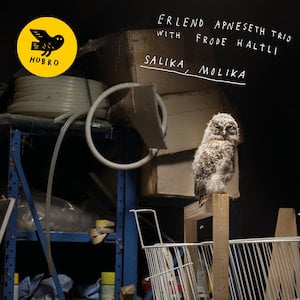 Erlend Apneseth Trio with Frode Haltli – Salika, Molika
Erlend Apneseth Trio with Frode Haltli – Salika, Molika
Hubro – 14 June 2019
On their 2016 debut, Det Andre Rommet, the Erlend Apneseth Trio created a new and exhilarating blueprint for Norwegian folk music and in doing so proved that a genre with ancient roots could be made entirely new. It’s follow-up, last year’s Åra, was both more immersive and more immediate and consolidated the band’s position as arch-innovators of the Scandinavian folk scene. After two such fearsome statements, the question of where to go next might have been a difficult one, but Apneseth and co have answered it by expanding their lineup, albeit temporarily, to a four-piece. On Salika, Molika, Apneseth (traditional Hardanger fiddle), Stephan Meidell (acoustic guitar, zither and electronics) and Øyvind Hegg-Lund (percussion) are joined by virtuoso accordionist Frode Haltli.
While Haltli’s presence adds an extra dimension to the music, the group’s attitude to recording remains as uncompromising as ever. Essentially they exist at the lonely intersection between Norwegian traditional music, free jazz and modern composition, but while that might suggest something intellectual rather than visceral, nothing could be further from the truth. The glitchy, icy electronics that introduce opening track Mor Song are soon mirrored by a beautiful, impressionistic layer of plucked strings. Here and throughout the album, there are liberal swathes of recorded sound, collage and modernistic electronics – the overall sound owes as much to musique concrete as to traditional musical forms, but it feels organic and improvisational.
The title track uses these slice and dice techniques to achieve something more song-like. Fiddle, accordion and skittering percussion build slowly over a haunting archive recording of Karen Hatleberg. But we are never entirely on predictable territory – the propulsive rhythms and yearning fiddle owe more to middle-eastern than northern European folk traditions. On Cirkus the effect is even more startling: the piece clicks and judders into life like a rusty piece of machinery, a haunted merry-go-round creaking of its own accord. From this grows an instrumental of tremendous, shifting complexity, at one moment clattering and heaving, at the next zipping around like an acrobat.
Pyramiden forms the album’s strange and beautiful centrepiece. The mood is processional, even occult, as Apneseth’s fiddle whirrs, looms and soars over booming percussion and a droning backdrop as the track moves from Twin Peaks weirdness to the evocation of pagan ritual and lysergic psych-folk. There is something of the strange and wonderful quality of the film scores that Popol Vuh made for Werner Herzog about Salika, Molika, and nowhere is this more evident than on Takle, with its frenzied cut-ups of the voice of traditional Norwegian singer Harald Takle.
There are more reflective moments too. Solreven’s opening is as still and bright as a glacial pool, before a motif inspired by the minimalism of Glass or Reich creeps in and settles down. Solreven (Norwegian for ‘sunfox’) flows into the final track on the album, Kirkeganger, an oneiric and at times unsettling piece, both highly modernistic and wonderfully earthy. It is a reminder that musical forms of the distant past can be closer in tone to those of the present day than we might otherwise believe, and in this case the result is eerie, even uncanny. But it is also somehow reassuring: wildness is still possible in folk music, as is a democratic, inclusive form of experimentalism. You are unlikely to hear a more innovative album all year, or one more in touch with its roots. Salika, Molika is an avant-folk marvel.
Order via Bandcamp (Digital/CD/Vinyl)
